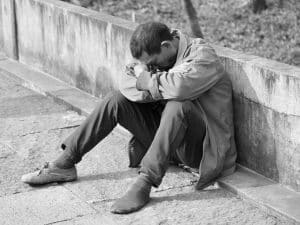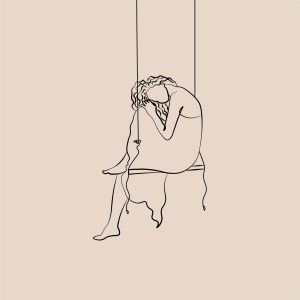Manhood may be all about that swagger, but here’s some statistics that might stagger.
In Singapore, males account for most suicides, at over 66.6% of all suicides reported.
A 2019 study released done by Ipsos, a market research company, also found that men are twice as likely than women to commit suicide.
We thought that big boys don’t cry. Is that tenacity and sturdiness mostly a façade?
Even though statistics generally show that women are more prone to depression compared to men as the former has a higher hormonal risk, researchers have also proposed that women seek help more often than men, leading them to be diagnosed more often.
It has also been suggested that men are not forthcoming about their mental struggles as it could be due to a gender normative culture that assumes males are ‘tougher’ and less likely to share their problems.
Toxic masculinity can also be a powerful force at play. This happens when boys and men are socialised to conform to ‘traditional masculinity ideology’.
This just ascribes to the well-known notion of ‘machismo’, ‘macho’ or ‘red-blooded’ – having men suppress emotions, masking distress and appearing hardy.
Men can also suffer from depression. However, the symptoms may come out differently, as irritability, aggression and more risk-taking behaviours.
Their coping mechanisms also differ, as they are more likely to over-indulge and turn to substance abuse. When describing their predicament, they often use terms such as ‘stress’ rather than feelings of sadness.
Men thus tend to underreport symptoms of depression. They usually note the physiological troubles such as a racing heart, digestive issues or headaches, and tend to see the doctor to treat the physical symptoms and not emotional ones.
Martin Williams, director and counsellor from Harmony Counselling quips, “The reluctance of men in expressing their concerns is totally understandable. I was raised in a socially conservative upbringing, where emotions were considered things to be repressed or controlled, and expressed only in very limited and socially acceptable ways.”
“However, my message to men who have grown up amongst similar belief systems is that seeking therapeutic support will help you learn to recognise, understand and express emotions in a healthy way. By addressing this issue in a safe and confidential environment, there is no shame or stigma associated with the process of becoming more open and it can have incredibly positive impacts in our lives in terms of increased personal resilience, life satisfaction and improved relationships with our loved ones.”
“According to research, the moment that you start to talk about the issue, the healing process will be initiated. Staying silent tends to bury the pain and distress, and does not solve anything. Further, it will come back again in a later phase of your life,” advises Eugene Chong, Principal Counselling Psychologist of Seeding Minds.
Martin also expresses that without treatment, mental health issues such as depression are unlikely to go away on their own, or recovery will take much longer. There is also the significant possibility that symptoms will actually get worse.
“Untreated depression makes you feel miserable and will affect all those in close proximity to you. It can cause problems in every aspect of your life including health, career, relationships and personal safety.”
Eugene had a 42-year old male client called Peter (not his real name), who is married with two kids and works in the pharmaceutical industry. Peter started his new role in Singapore in the middle of 2019.
Prior to that, he was working in Beijing and Japan for 20 years. His new job placement in Singapore triggered anxiety and panic symptoms and he dreaded going to work.
His overall confidence plunged and he began to withdraw socially. Eventually his sleep, appetite and energy levels were affected and he would break down in tears uncontrollably every other day.
Peter knew that it was time to seek help and was diagnosed with mixed anxiety and depression.
While on medication, he consulted therapy and it allowed him to process his thoughts and emotions in a safe environment.
After a couple of targeted sessions that addressed his confidence level for work, he reported being less depressed and anxious, and has been able to utilise the coping strategies discussed during the sessions.
Many males may be initially uncomfortable about seeing a counsellor, but those that have taken the initial step to approach one feel good talking to a trained professional.
Martin shares about his male clientele, “The initial sense of relief they gained from this experience was therapeutic on its own, and as they learned they could trust me and that whatever they shared would be free from judgment, they were then able to start expressing their feelings more. What they experienced in the sessions, they were, slowly but surely, able to apply to their lives outside.”
Martin further reports that many of them have described their experiences as having a weight lifted from their shoulders and have gone on to lead much more fulfilling lives as a result, often as a result of improved understanding and communication within their relationships.
“All of my male clients have said they benefited from the counselling experience and several have even stopped medication after a few sessions. I hope these stories continue to be told so that we can challenge ongoing perceptions around men and mental health.”
Big boys do cry, and when they do, they are taking bold steps by coming to terms with their feelings. This is the first step out of murky waters that they might have been entrenched in for too long.
Eugene Chong is the Director / Principal Counselling Psychologist with Seeding Minds with 16 years of experience under his belt. He is also an adjunct lecturer at various schools that offer approved psychology and counselling training programmes, from Diploma to Masters Levels. Some of his specialties are men’s mental health, marriage and partnerships and eating disorders.
Martin Williams has a Graduate Diploma in Counselling Psychology. Apart from men’s mental health, his other specialties include anxiety and panic disorders, bipolar disorders and issues surrounding personal growth and self-esteem.
Sources:
https://www.hcamag.com/asia/specialisation/mental-health/mens-mental-health-its-time-to-talk/258673
https://www.verywellmind.com/why-is-depression-more-common-in-women-1067040
Known as Nate, I am someone who cannot quit wielding the pen or punching the QWERTY, no matter where life brings me. Writing has always been the most effective conduit for channeling my wanted or unwanted opinions since I was an undergraduate at NUS. Naturally, I used this skill as a means of sustenance after working as a writer and editor for many years until I decided to start a business in music. That did not put a halt to my marriage with the vernacular.
In October 2016, I graduated with my Masters in Visual and Media Anthropology, which is the study of cultures through films and photography, at Freie Universität Berlin. This transitory period of residing in two cities has pushed the boundaries of my creativity and my battles with word count have not ceased.
Now a new mode of writing, the academic one, has been added to my existing smorgasbord of corporate and lifestyle collaterals, articles, advertisements, annual reports and books. At the moment, my learning curve is an uphill journey as I attempt to grasp the camera for stills and motion clips, while I juggle that with developing my love affair with my other mode of expression – electronic music.




